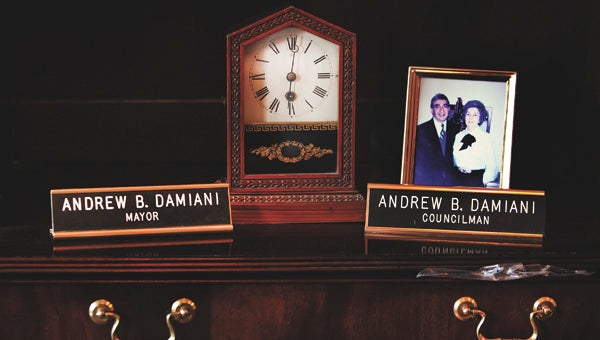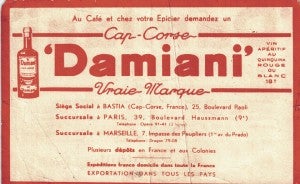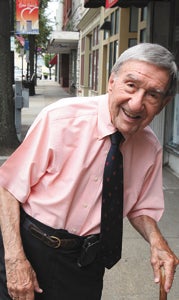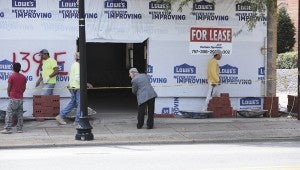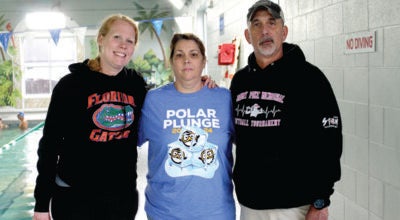Damiani: From ‘Son of Bitche’ to Suffolk
Published 2:58 pm Wednesday, January 20, 2016
Story by Phyllis Speidell
So you think you know Andy Damiani?
Of course he’s a former councilman and mayor, businessman, First Citizen and fervent, if sometimes flamboyant, Suffolk booster. But when Damiani asked us to capture his life in a biography, John Sheally and I realized that, even as journalists, we never saw the other sides of Mr. Downtown.
No one called him “Andy” until he came to Suffolk in the late 1950s.
Born Andrew Damiani in Richmond, in 1921, he was “Andre” to everyone he knew. His mother was from Corsica. His father was a naturalized U.S. citizen by virtue of his birth in Pensacola, Fla., where Damiani’s grandparents ran a produce business for a few years before returning to Corsica.
You might remember another well-known Corsican whose personality and achievements also surpassed his physical stature — Napoleon Bonaparte.
He is a classically trained musician with a love of jazz — and Mozart.
Damiani picked up a violin when he was in elementary school and moved on to the double bass at Thomas Jefferson High School in Richmond. He joined the musicians’ union before he was 16 so he could play paying gigs around Richmond.
Wanting more, Damiani packed up his bass and went to Manhattan to audition, cold, at the Juilliard School of Music. He hung around Tin Pan Alley and picked up jobs around Manhattan and the Catskills to pay his tuition.
Damiani is a “Son of Bitche”
When he was drafted out of Juilliard and into the Army in 1942, Damiani did double duty — as an infantry soldier and as a squad leader in the 100th Infantry headquarters band, where he played E-flat horn as well as bass.
Stateside, after basic training, the band played at war bond rallies and military ceremonies. Damiani also teamed up with a guitarist and a vibraphone player to form a trio that played at the general’s official functions. That all changed, however, when the 100th Infantry was deployed to Europe.
The 100th shipped out in 1944 and fought its way across France toward Alsace-Lorraine and the Nazi-held citadel of Bitche. Damiani stood guard duty and played the foxhole circuit, buoying the morale of soldiers trying to survive the winter campaign.
Three months of fighting finally pushed the Nazis out of Bitche and earned the 100th the title of “Sons of Bitche.” The general ordered the band to play as the troops marched into the town in mid-March 1945.
“There I was in a dirt courtyard, one foot in a pile of manure, a carbine at my side and my horn in my hands, but I don’t know that I ever played a note that day. I was too busy watching for German snipers on the rooftops,” Damiani said.
Damiani traded fatigues for center stage
The war over, he maneuvered his discharge to Paris so he could search for his grandfather, a Corsican winemaker in hiding from the Nazis.
Grandfather found, Damiani also found a piano player and a guitarist to form a jazz trio. They toured Europe for the next decade, performing all over France, Norway and Switzerland. He performed with Eartha Kitt and other celebrities and made friends among them, including American singer Jane Morgan.
The proof is in the archives
Damiani is a born entertainer and storyteller. He doesn’t carry a camera or a journal but records everything in his mind. “I tell my stories so I won’t forget,” he said.
Unlike most storytellers, he compiled an archive that corroborates his stories from Richmond to Manhattan to Bitche to Paris to Suffolk. His archive is now securely ensconced in the Historical Society of Virginia in Richmond.
He is a natural — and often frustrated — urban planner
“In Suffolk I floated around a lot of ideas. Some stuck,” Damiani said about his ideas to make the core city a vibrant, mixed-use community of residences, businesses and municipal offices.
He opened the first laundromat in downtown in the 1960s, when many homes were still without indoor plumbing. He created the first downtown business mall at Washington Square and rehabbed numerous buildings in Suffolk’s central business district.
“I learned early on that you have to grow vertically, not horizontally,” he said. “I was always pretty much urban by instinct, and my ideas came from Richmond, New York and Paris. The military also had an impact. You don’t say we can’t do something — you just do it.”
At 94, Damiani has spent a lifetime doing just that.
Writer Phyllis Speidell and photographer John Sheally, who worked together for years in The Virginian-Pilot’s Suffolk newsroom, are producing Andy Damiani’s biography “Damiani Here — the Story and Stories of Andy Damiani” which is due to be released in 2016.


